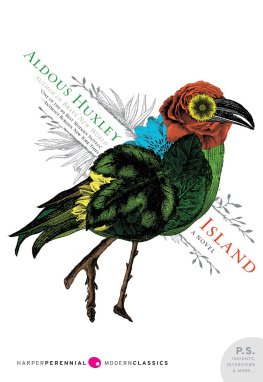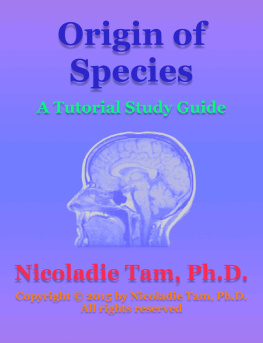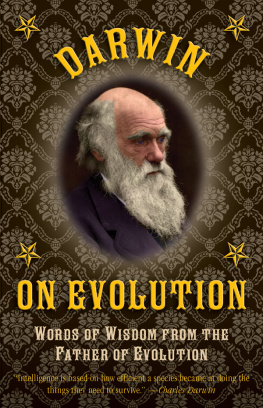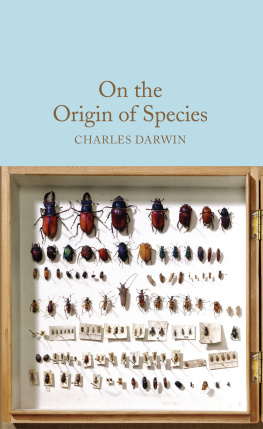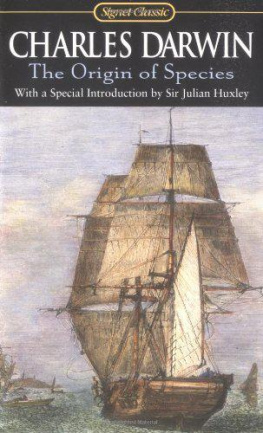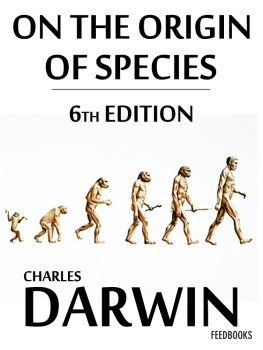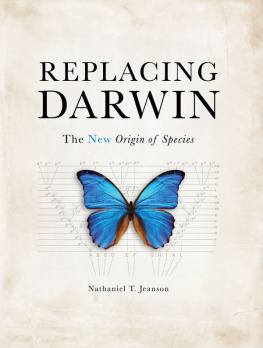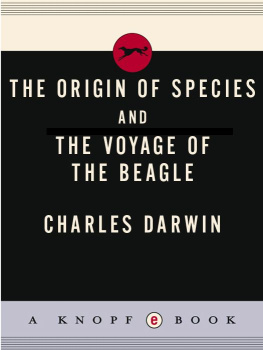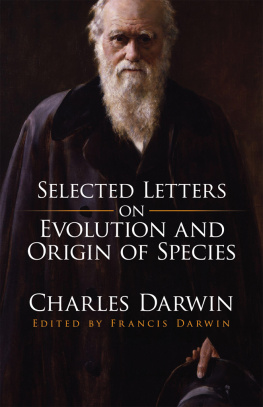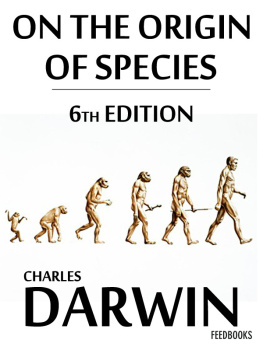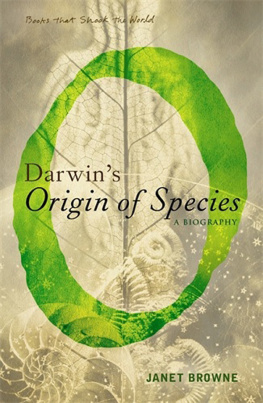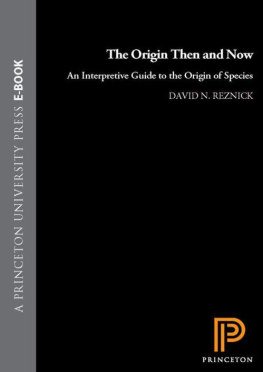ON THE ORIGIN OF SPECIES
THOMAS H. HUXLEY

This 2011 edition published by Barnes & Noble, Inc.
All rights reserved. No part of this publication may be reproduced, stored in a retrieval system, or transmitted, in any form or by any means, electronic, mechanical, photocopying, recording, or otherwise, without prior written permission from the publisher.
Barnes & Noble, Inc.
122 Fifth Avenue
New York, NY 10011
ISBN: 978-1-4114-4450-8
PREFACE TO THE AMERICAN EDITION
T HE publication of Mr. Darwin's work on the "Origin of Species," whether we consider the importance of the questions it raises, the ability with which he treats them, the boldness and originality of his speculations, or the profound and universal interest which the book awakened, must be looked upon as marking an era in the progress of science. But while it called forth a due share of candid discussion and intelligent criticism, it has been vehemently and persistently assailed by many who understood nothing of its real character; and the subject has hence been so overloaded with prejudice and perversion that unscientific people hardly know what to think or believe about it. In these circumstances, those who disencumber the subject of its difficulties, simplify its statements, relieve it of technicalities, and bring it so distinctly within the horizon of ordinary apprehension that persons of common sense may judge for themselves, perform an invaluable service. Such is the character of the present volume.
Prefixed to the English edition, is the following note from Professor Huxley: "Mr. J. Aldous Mays, who is taking shorthand notes of my 'Lectures to Working Men,' has asked me to allow him, on his own account, to print those notes for the use of my audience. I willingly accede to this request, on the understanding that a notice is prefixed to the effect that I have no leisure to revise the Lectures, or to make alterations in them, beyond the correction of any important error in a matter of fact."
The reader will not regret that the Lectures appear in this form. Taken from the lips of the distinguished naturalist, as he addressed an audience of 'Working Men,' they have a clearness, a directness, and a simplicity which belonged to the circumstances of their delivery. In this respect, the following Lectures are incomparable. Dealing with the most abstruse and fundamental questions of mind and organization, these subjects are nevertheless presented in so lucid and attractive a manner as to impress vividly the commonest imagination.
The gift of translating the high questions of science into popular forms of expression, without sacrificing accuracy and introducing error, is a very rare one among scientific men, but Professor Huxley possesses it in an eminent degree: his lectures are models of their class.
LECTURE I
THE PRESENT CONDITION OF ORGANIC NATURE
W HEN it was my duty to consider what subject I would select for the six lectures which I shall now have the pleasure of delivering to you, it occurred to me that I could not do better than endeavour to put before you in a true light, or in what I might perhaps with more modesty call, that which I conceive myself to be the true light, the position of a book which has been more praised and more abused, perhaps, than any book which has appeared for some years;I mean Mr. Darwin's work on the "Origin of Species." That work, I doubt not, many of you have read; for I know the inquiring spirit which is rife among you. At any rate, all of you will have heard of it,some by one kind of report and some by another kind of report; the attention of all and the curiosity of all have been probably more or less excited on the subject of that work. All I can do, and all I shall attempt to do, is to put before you that kind of judgment which has been formed by a man, who, of course, is liable to judge erroneously; but at any rate, of one whose business and profession it is to form judgments upon questions of this nature.
And here, as it will always happen when dealing with an extensive subject, the greater part of my courseif, indeed, so small a number of lectures can be properly called a coursemust be devoted to preliminary matters, or rather to a statement of those facts and of those principles which the work itself dwells upon, and brings more or less directly before us. I have no right to suppose that all or any of you are naturalists; and even if you were, the misconceptions and misunderstandings prevalent even among naturalists on these matters would make it desirable that I should take the course I now propose to take,that I should start from the beginning,that I should endeavour to point out what is the existing state of the organic worldthat I should point out its past conditionthat I should state what is the precise nature of the undertaking which Mr. Darwin has taken in hand; that I should endeavour to show you what are the only methods by which that undertaking can be brought to an issue, and to point out to you how far the author of the work in question has satisfied those conditions, how far he has not satisfied them, how far they are satisfiable by man, and how far they are not satisfiable by man. And for tonight, in taking up the first part of this question, I shall endeavour to put before you a sort of broad notion of our knowledge of the condition of the living world. There are many ways of doing this. I might deal with it pictorially and graphically. Following the example of Humboldt in his "Aspects of Nature," I might endeavour to point out the infinite variety of organic life in every mode of its existence, with reference to the variations of climate and the like; and such an attempt would be fraught with interest to us all; but considering the subject before us, such a course would not be that best calculated to assist us. In an argument of this kind we must go further and dig deeper into the matter; we must endeavour to look into the foundations of living Nature, if I may so say, and discover the principles involved in some of her most secret operations. I propose, therefore, in the first place, to take some ordinary animal with which you are all familiar, and, by easily comprehensible and obvious examples drawn from it, to show what are the kind of problems which living beings in general lay before us; and I shall then show you that the same problems are laid open to us by all kinds of living beings. But, first, let me say in what sense I have used the words "organic nature." In speaking of the causes which lead to our present knowledge of organic nature, I have used it almost as an equivalent of the word "living," and for this reason,that in almost all living beings you can distinguish several distinct portions set apart to do particular things and work in a particular way. These are termed "organs," and the whole together is called "organic." And as it is universally characteristic of them, this term "organic" has been very conveniently employed to denote the whole of living nature,the whole of the plant world, and the whole of the animal world.
Few animals can be more familiar to you than that whose skeleton is shown on this diagram. You need not bother yourselves with this "Equus caballus" written under it; that is only the Latin name of it, and does not make it any better. It simply means the common Horse. Suppose we wish to understand all about the Horse. Our first object must be to study the structure of the animal. The whole of his body is inclosed within a hide, a skin covered with hair; and if that hide or skin be taken off, we find a great mass of flesh, or what is technically called muscle, being the substance which by its power of contraction enables the animal to move. These muscles move the hard parts one upon the other, and so give that strength and power of motion which renders the Horse so useful to us in the performance of those services in which we employ him.


